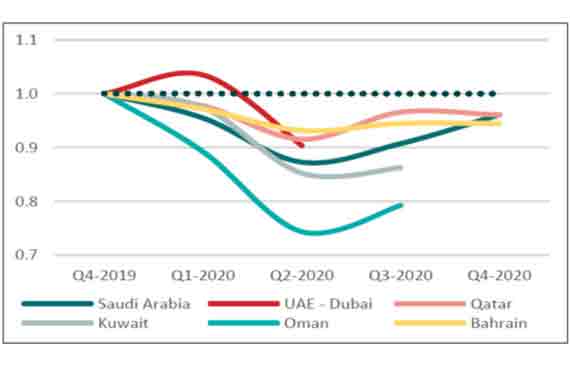GCC Outperforming Global Economy

The GCC is likely to continue outperforming the global economy in 2023 in economic growth with GCC states’ GDP growth to be around 4.2 percent in the year ahead after ending 2022 close to 6.5 percent.
The International Monetary Fund (IMF) recently predicted that 2023 will be the weakest year for global economic growth since 2009 at 2.7 percent, 0.9 percent lower than it had been forecasting in the first half of 2022, not including the low point of the Covid-19 pandemic. The IMF forecast differs significantly from the GCC forecast. When compared to western nations, the disparity is even more pronounced, with the IMF projecting only 1.0 percent real GDP growth for the US this year and 0.5 percent for the Euro area.
Egypt's economy is anticipated to expand by 4.7 percent in the fiscal year 2022-2023, down from the prior expectation of 5.7 percent. The analysis asserts that markets should start recovering by the summer, while the investment trends of 2022 may persist into the first quarter of 2023. US interest rates, which are now at 4.33 percent and have been the primary cause of investors' risk aversion, will peak later this year, with a recessionary conclusion probable in the first half.
Traditional investments like bonds and equities have become less appealing to investors due to rapidly rising interest rates than cash deposit rates, but once the predicted US recession materializes, that should be a signal to invest in risk assets, especially since stock prices are likely to bottom out fairly soon once it does. While as investors they can never be sure what is around the corner, 2022’s negative story is now probably much closer to being played out and they are very close to the end of what has been a difficult bear market for both stocks and bonds. Prescient investors will be analyzing the likely good earnings recovery that can be anticipated in 2024 by the middle of the year at the latest.
Equity markets frequently project out 9–16 months. Smart investors are also aware that unforeseen events occasionally intervene in everything. The hydrocarbon exporters in the GCC region continue to receive significant oil income, which serves as a cushion for regional non-oil and gas sector activity and has helped bring government balance sheets back into surplus.
Emerging prospects include the anticipated rise in investments connected to sustainability. The green bond market recently reached the milestone of USD two trillion in value, and sustainable bonds, including social, sustainability, sustainability-linked, and transition bonds, reached a combined value of USD 3.5 trillion at the end of the third quarter of last year.
With the establishment of significant trading platforms in the GCC and Mena areas, carbon trading will have an increasing impact on the MENA financial environment. These included the United Arab Emirates, where the first fully regulated carbon trading market was established through cooperation between Abu Dhabi Global Markets (ADGM) and AirCarbon Exchange (ACX). Additionally, ADGM became the first jurisdiction to license exchanges and clearing houses that run both spot and derivatives markets, as well as to regulate carbon credits and offsets as environmental instruments, a class of financial products. The Regional Voluntary Carbon Market, based in Saudi Arabia, as well as the Egyptian government's creation of the first African voluntary carbon market during the COP27 climate meeting, are other regional projects.


.jpg)
